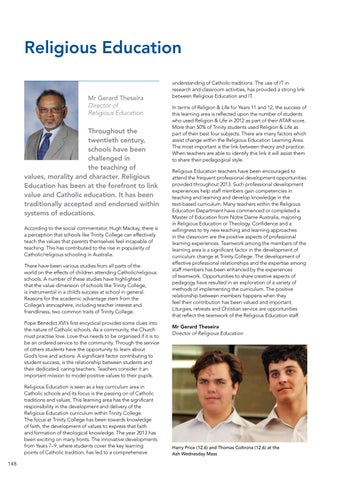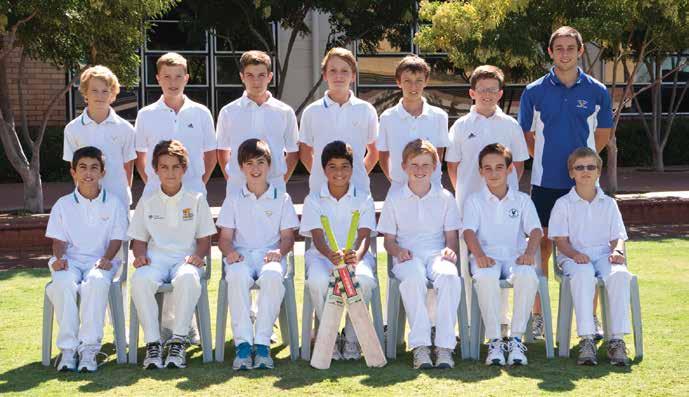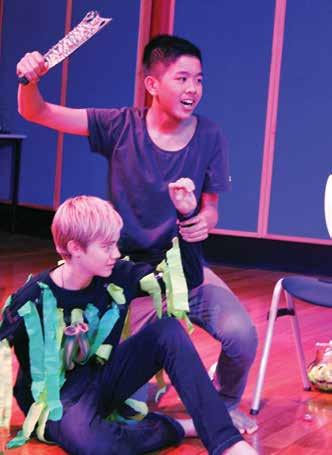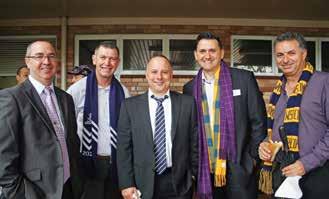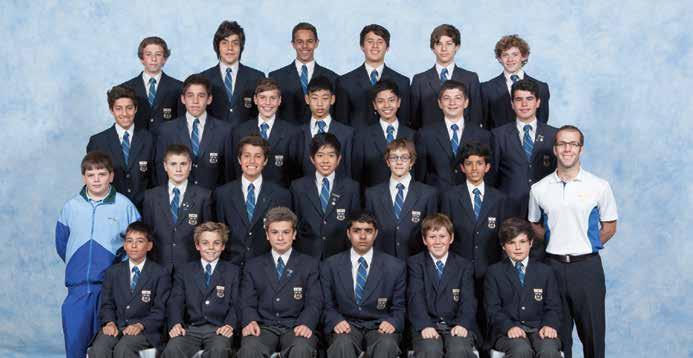Religious Education Mr Gerard Theseira Director of Religious Education
Throughout the twentieth century, schools have been challenged in the teaching of values, morality and character. Religious Education has been at the forefront to link value and Catholic education. It has been traditionally accepted and endorsed within systems of educations. According to the social commentator, Hugh Mackay, there is a perception that schools like Trinity College can effectively teach the values that parents themselves feel incapable of teaching. This has contributed to the rise in popularity of Catholic/religious schooling in Australia. There have been various studies from all parts of the world on the effects of children attending Catholic/religious schools. A number of these studies have highlighted that the value dimension of schools like Trinity College, is instrumental in a child’s success at school in general. Reasons for the academic advantage stem from the College’s atmosphere, including teacher interest and friendliness, two common traits of Trinity College. Pope Benedict XVI’s first encyclical provides some clues into the nature of Catholic schools. As a community, the Church must practise love. Love thus needs to be organised if it is to be an ordered service to the community. Through the service of others students have the opportunity to learn about God’s love and actions. A significant factor contributing to student success, is the relationship between students and their dedicated, caring teachers. Teachers consider it an important mission to model positive values to their pupils. Religious Education is seen as a key curriculum area in Catholic schools and its focus is the passing on of Catholic traditions and values. This learning area has the significant responsibility in the development and delivery of the Religious Education curriculum within Trinity College. The focus at Trinity College has been towards knowledge of faith, the development of values to express that faith and formation of theological knowledge. The year 2013 has been exciting on many fronts. The innovative developments from Years 7–9, where students cover the key learning points of Catholic tradition, has led to a comprehensive 148
understanding of Catholic traditions. The use of IT in research and classroom activities, has provided a strong link between Religious Education and IT. In terms of Religion & Life for Years 11 and 12, the success of this learning area is reflected upon the number of students who used Religion & Life in 2012 as part of their ATAR score. More than 50% of Trinity students used Religion & Life as part of their best four subjects. There are many factors which assist change within the Religious Education Learning Area. The most important is the link between theory and practice. When teachers are able to identify this link it will assist them to share their pedagogical style. Religious Education teachers have been encouraged to attend the frequent professional development opportunities provided throughout 2013. Such professional development experiences help staff members gain competencies in teaching and learning and develop knowledge in the text-based curriculum. Many teachers within the Religious Education Department have commenced or completed a Master of Education from Notre Dame Australia, majoring in Religious Education or Theology. Confidence and a willingness to try new teaching and learning approaches in the classroom are the positive aspects of professional learning experiences. Teamwork among the members of the learning area is a significant factor in the development of curriculum change at Trinity College. The development of effective professional relationships and the expertise among staff members has been enhanced by the experiences of teamwork. Opportunities to share creative aspects of pedagogy have resulted in an exploration of a variety of methods of implementing the curriculum. The positive relationship between members happens when they feel their contribution has been valued and important. Liturgies, retreats and Christian service are opportunities that reflect the teamwork of the Religious Education staff. Mr Gerard Theseira Director of Religious Education
Harry Price (12.6) and Thomas Coltrona (12.6) at the Ash Wednesday Mass
